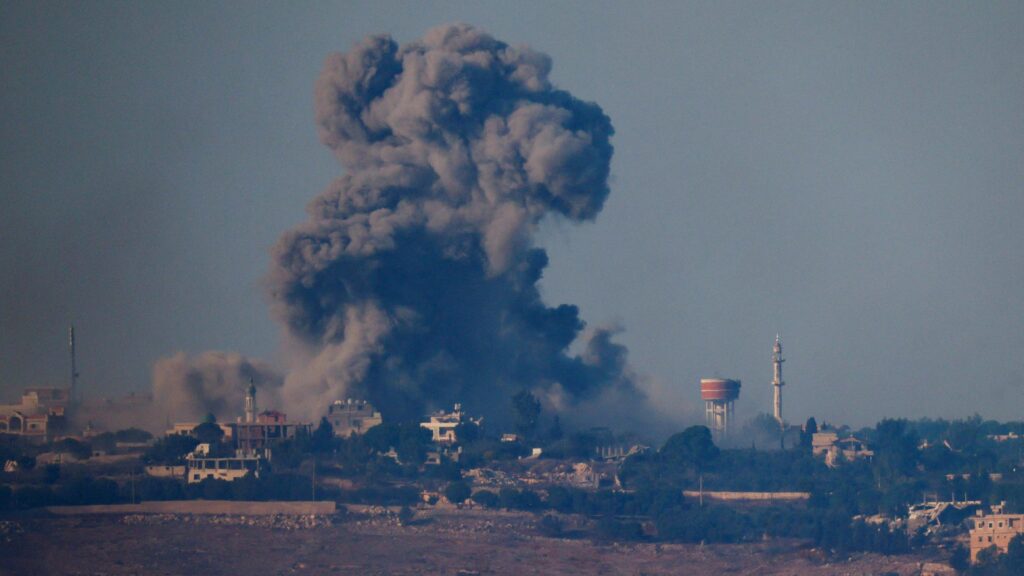The Lebanese army says two of its soldiers have been killed in Israeli attacks in southern Lebanon, as Israeli forces continued their invasion against Hezbollah and ordered another 20 towns and villages to be evacuated.
One soldier was killed during a Red Cross rescue operation, while the second was killed at his post, according to the Lebanese army, which has tried to stay out of the conflict.
The Israeli military did not comment but said its forces had killed Hezbollah fighters in airstrikes and firefights while dismantling the Iranian-backed group’s infrastructure and weapons near the border.
Hezbollah said it had attacked Israeli forces on both sides of the border.
Meanwhile, in Beirut’s southern suburbs, Israeli aircraft increased airstrikes on what the military said were targets of Hezbollah’s intelligence headquarters, weapons production sites and weapons storage facilities.
Hezbollah said one of the attacks hit a building housing its media office.
A civil defense organization affiliated with Hezbollah also said that seven of its first responders were among nine people killed the night before in an attack on a residential building in the center of the capital.
Lebanon’s health minister later said that more than 40 paramedics and firefighters had been killed by Israeli fire in the past three days.
According to local authorities, two weeks of Israeli strikes and other attacks on Hezbollah have killed more than 1,300 people across Lebanon and displaced more than a million.
Israel went on the offensive after nearly a year of cross-border hostilities sparked by the war in Gaza, saying it wanted to ensure the safe return of residents of border areas displaced by Hezbollah’s rocket, rocket and drone attacks.
Hezbollah is a Shia Islamist military, political and social organization that wields significant power in Lebanon. It is designated as a terrorist organization by Israel, the US, Britain and other countries.
This embedded content is not available in your region.
The two deadly attacks on Lebanese soldiers were only hours apart on Thursday, the third full day of the invasion.
In the first incident, the army said, one soldier was killed and another injured “as a result of aggression by the Israeli enemy during an evacuation and rescue operation with the Lebanese Red Cross in the village of Taybeh.”
The Red Cross said four of its volunteers were also slightly injured and their movements had been coordinated with U.N. peacekeepers.
The army said that in the second incident, another soldier was killed “after the Israeli enemy attacked an army post in the Bint Jbeil area.”
“Personnel at the post responded to the sources of fire,” the Lebanese army added, marking a rare involvement in the conflict.
The news came as the Israeli Defense Forces (IDF) told residents of another 20 towns and villages in the south, including the regional capital Nabatieh, to leave immediately for their own safety.
Unlike the communities that had to be evacuated on Tuesday, they are all located north of the Litani River, which is about 30 km from the border.
Before the invasion, Israel had demanded that Hezbollah withdraw to the Litani, in accordance with a UN Security Council resolution that ended their last war in 2006.
Speaking to the BBC from Beirut, the World Food Program country director in Lebanon, Matthew Hollingworth, described the situation there as “horrendous”.
“There is black smoke floating over the southern suburbs and we see it every morning when we come to work and we see it all day long. And there are a striking number of people who are displaced in the city.”
“There are these cars everywhere that come from people who fled the fighting in the south of the country and the southern suburbs. There is traffic everywhere and people sleep outside.”
Juan Gabriel Wells, country director for Lebanon at the International Rescue Committee, said nearly half of the displaced people interviewed by his organization in government shelters were children under the age of 15.
The IDF also announced Thursday that its aircraft had struck 200 Hezbollah “terrorist targets” in southern Lebanon and elsewhere overnight, including weapons storage facilities and observation posts. About 15 Hezbollah fighters were killed when the municipal building in Bint Jbeil was hit, the report said.
It was later said that a building housing three Hezbollah commanders was destroyed in a joint operation between the air force and infantry forces of the Golani Brigade.
Hezbollah said on Thursday evening that its fighters had repelled “unsuccessful attempts” by Israeli commandos to enter some border villages during the day.
The group also said it had targeted “enemy gatherings” and homes across the border, while also continuing to fire rockets deep into Israel’s north.
The IDF said more than 230 projectiles were fired into Israeli territory during the day. Most were intercepted or fell in open areas, and there were no reports of casualties.
The communities along Israel’s northern border fence now form a closed military zone.
Dean Sweetland, a former British soldier who moved to Israel eight years ago, is one of the few people still living in a nearly empty kibbutz within sight of the Lebanese town of Bint Jbeil.
He told the BBC that his house was shaken several times a day by rockets and anti-tank missiles fired from Lebanon, some of which were intercepted by Israeli air defenses overhead.
“We cannot continue this for another year when Hezbollah is at our border waiting to launch an attack on us on October 7,” he said, referring to last year’s deadly Hamas attack on southern Israel, which sparked the war in Gaza.
“But my son is in the army, and do we want our children to be slaughtered there, where Hezbollah has been waiting for us for almost twenty years?”
“It won’t be pretty,” he continued, “but if that’s what it takes, then that’s what it takes.”

